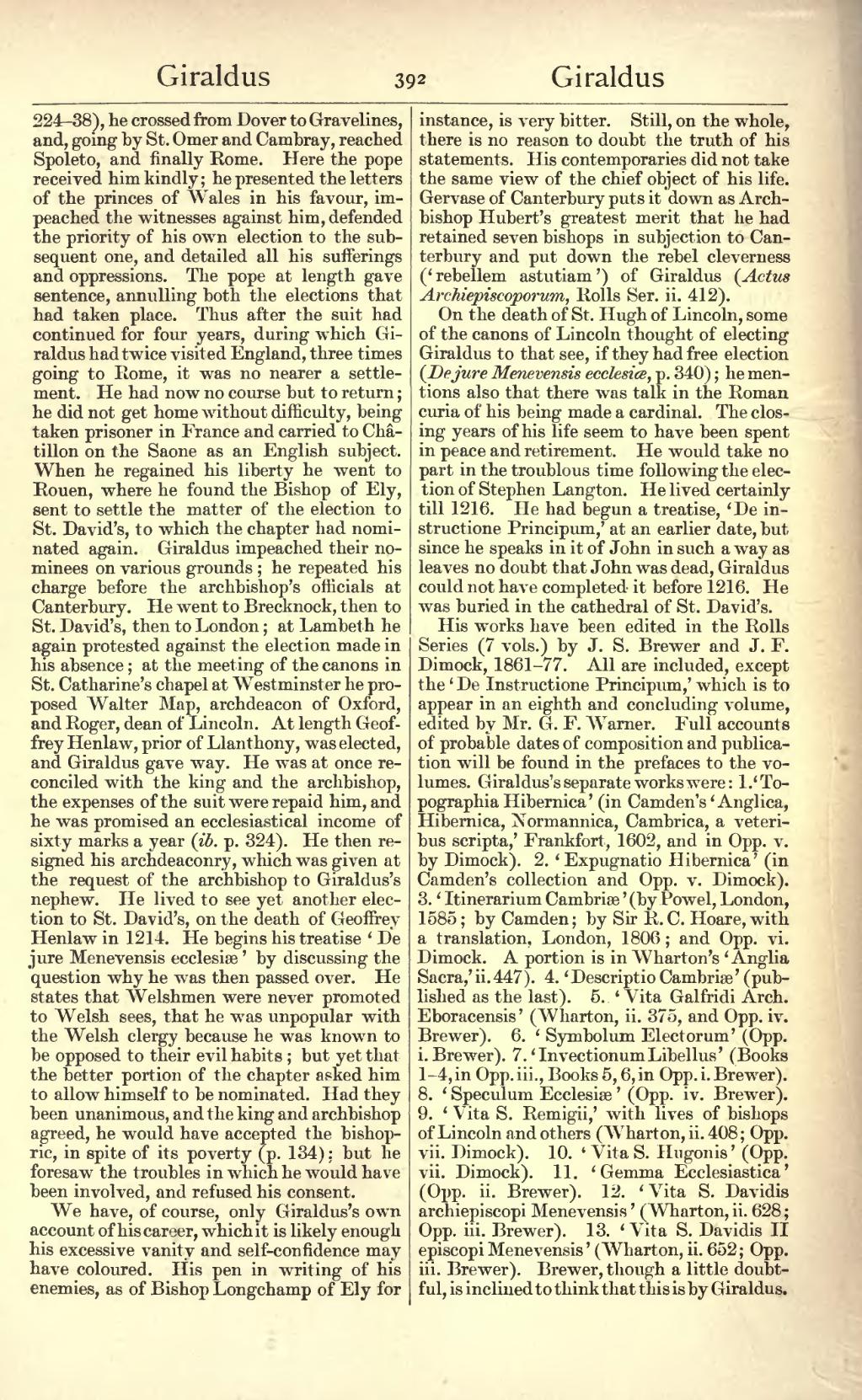224–38), he crossed from Dover to Gravelines, and, going by St. Omer and Cambray, reached Spoleto, and finally Rome. Here the pope received him kindly; he presented the letters of the princes of Wales in his favour, impeached the witnesses against him, defended the priority of his own election to the subsequent one, and detailed all his sufferings and oppressions. The pope at length gave sentence, annulling both the elections that had taken place. Thus after the suit had continued for four years, during which Giraldus had twice visited England, three times going to Rome, it was no nearer a settlement. He had now no course but to return; he did not get home without difficulty, being taken prisoner in France and carried to Châtillon on the Saone as an English subject. When he regained his liberty he went to Rouen, where he found the Bishop of Ely, sent to settle the matter of the election to St. David's, to which the chapter had nominated again. Giraldus impeached their nominees on various grounds; he repeated his charge before the archbishop's officials at Canterbury. He went to Brecknock, then to St. David's, then to London; at Lambeth he again protested against the election made in his absence; at the meeting of the canons in St. Catharine's chapel at Westminster he proposed Walter Map, archdeacon of Oxford, and Roger, dean of Lincoln. At length Geoffrey Henlaw, prior of Llanthony, was elected, and Giraldus gave way. He was at once reconciled with the king and the archbishop, the expenses of the suit were repaid him, and he was promised an ecclesiastical income of sixty marks a year (ib. p. 324). He then resigned his archdeaconry, which was given at the request of the archbishop to Giraldus's nephew. He lived to see yet another election to St. David's, on the death of Geoffrey Henlaw in 1214. He begins his treatise ‘De jure Menevensis ecclesiæ’ by discussing the question why he was then passed over. He states that Welshmen were never promoted to Welsh sees, that he was unpopular with the Welsh clergy because he was known to be opposed to their evil habits; but yet that the better portion of the chapter asked him to allow himself to be nominated. Had they been unanimous, and the king and archbishop agreed, he would have accepted the bishopric, in spite of its poverty (p. 134); but he foresaw the troubles in which he would have been involved, and refused his consent.
We have, of course, only Giraldus's own account of his career, which it is likely enough his excessive vanity and self-confidence may have coloured. His pen in writing of his enemies, as of Bishop Longchamp of Ely for instance, is very bitter. Still, on the whole, there is no reason to doubt the truth of his statements. His contemporaries did not take the same view of the chief object of his life. Gervase of Canterbury puts it down as Archbishop Hubert's greatest merit that he had retained seven bishops in subjection to Canterbury and put down the rebel cleverness (‘rebellem astutiam’) of Giraldus (Actus Archiepiscoporum, Rolls Ser. ii. 412).
On the death of St. Hugh of Lincoln, some of the canons of Lincoln thought of electing Giraldus to that see, if they had free election (De jure Menevensis ecclesiæ, p. 340); he mentions also that there was talk in the Roman curia of his being made a cardinal. The closing years of his life seem to have been spent in peace and retirement. He would take no part in the troublous time following the election of Stephen Langton. He lived certainly till 1216. He had begun a treatise, ‘De instructione Principum,’ at an earlier date, but since he speaks in it of John in such a way as leaves no doubt that John was dead, Giraldus could not have completed it before 1216. He was buried in the cathedral of St. David's. His works have been edited in the Rolls Series (7 vols.) by J. S. Brewer and J. F. Dimock, 1861–77. All are included, except the ‘De Instructione Principum,’ which is to appear in an eighth and concluding volume, edited by Mr. G. F. Warner. Full accounts of probable dates of composition and publication will be found in the prefaces to the volumes. Giraldus's separate works were:
- ‘Topographia Hibernica’ (in Camden's ‘Anglica, Hibernica, Normannica, Cambrica, a veteribus scripta,’ Frankfort, 1602, and in Opp. v. by Dimock).
- ‘Expugnatio Hibernica’ (in Camden's collection and Opp. v. Dimock).
- ‘Itinerarium Cambriæ’ (by Powel, London, 1585; by Camden; by Sir R. C. Hoare, with a translation, London, 1806; and Opp. vi. Dimock. A portion is in Wharton's ‘Anglia Sacra,’ ii. 447).
- ‘Descriptio Cambriæ’ (published as the last).
- ‘Vita Galfridi Arch. Eboracensis’ (Wharton, ii. 375, and Opp. iv. Brewer).
- ‘Symbolum Electorum’ (Opp. i. Brewer).
- ‘Invectionum Libellus’ (Books 1–4, in Opp. iii., Books 5, 6, in Opp. i. Brewer).
- ‘Speculum Ecclesiæ’ (Opp. iv. Brewer).
- ‘Vita S. Remigii,’ with lives of bishops of Lincoln and others (Wharton, ii. 408; Opp. vii. Dimock).
- ‘Vita S. Hugonis’ (Opp. vii. Dimock).
- ‘Gemma Ecclesiastica’ (Opp. ii. Brewer).
- ‘Vita S. Davidis archiepiscopi Menevensis’ (Wharton, ii. 628; Opp. iii. Brewer).
- ‘Vita S. Davidis II episcopi Menevensis’ (Wharton, ii. 652; Opp. iii. Brewer). Brewer, though a little doubtful, is inclined to think that this is by Giraldus.
